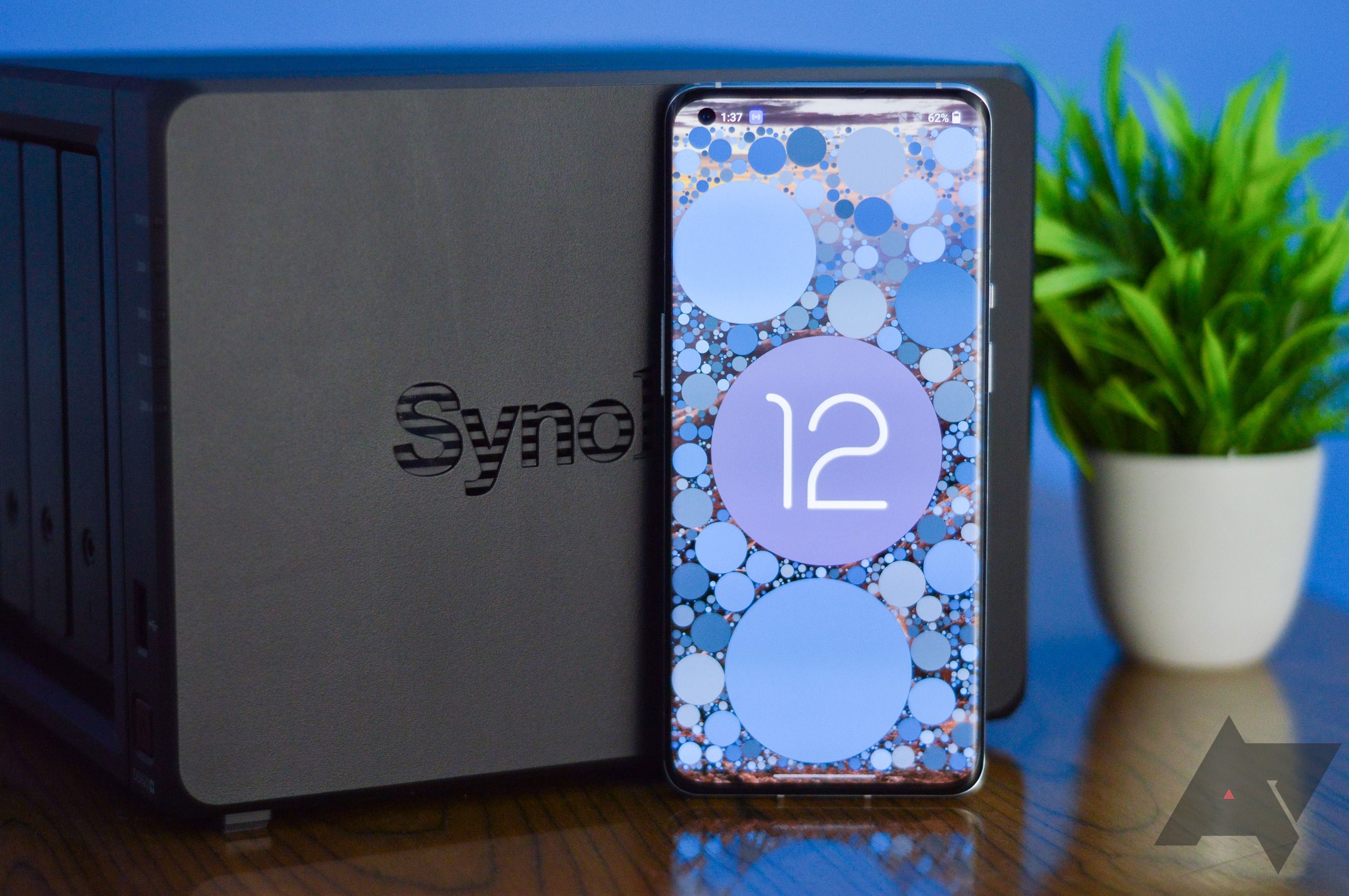- Like
- SHARE
- Digg
- Del
- Tumblr
- VKontakte
- Flattr
- Buffer
- Love This
- Save
- Odnoklassniki
- Meneame
- Blogger
- Amazon
- Yahoo Mail
- Gmail
- AOL
- Newsvine
- HackerNews
- Evernote
- MySpace
- Mail.ru
- Viadeo
- Line
- Comments
- Yummly
- SMS
- Viber
- Telegram
- JOIN
- Skype
- Facebook Messenger
- Kakao
- LiveJournal
- Yammer
- Edgar
- Fintel
- Mix
- Instapaper
- Copy Link
Synology has a full range of consumer-facing network attached storage (NAS) devices that are suitable for users, ranging from home shoppers to small businesses. While it’s still easy to take your pick based only on your storage requirements, these NAS units have a lot going on under the hood that can affect the performance if the hardware isn’t right for the apps you want to run (like Plex).
To help you make sense of all the DiskStations on offer, we’ve put together a list of the best Synology NAS that you can invest in.
Any pricing detail provided in this guide is for the NAS units alone and doesn’t include the cost of hard drives. The overall price can add up when these NAS-specific HDDs are factored in and can vary depending on the capacity you opt for.
With all the upgraded internals the DS920+ brings to the table over its cheaper siblings, it becomes a sweet spot for prosumers who want to do more but without breaking the bank. The more powerful Celeron CPU and 4GB of default RAM give the NAS the extra horsepower to run more demanding apps and tasks like multi-camera surveillance and team collaboration. While the four-drive system should be enough for most users and home offices, the DS920+ lets you add an expansion unit if your storage needs increase later on, making it a future-proof investment.
- CPU: Quad-core Intel Celeron J4125
- Memory: 4GB, expandable up to 8GB
- Drive Bays: 4 bays supporting up to 16TB each
- Expansion: Yes
- Ports: 2x 1Gbe LAN, 2x USB 3.2 Gen 1, 1x eSATA
- Caching: 2x NVMe slots
- OS: DSM 7.0
- Price: $550
- Beefy processor.
- Excellent for Plex streaming.
- Two NVMe drive slots.
- User interface is consumer friendly.
- Lacks multi-gigabit LAN ports.
- NVMe drives can’t be used as storage.
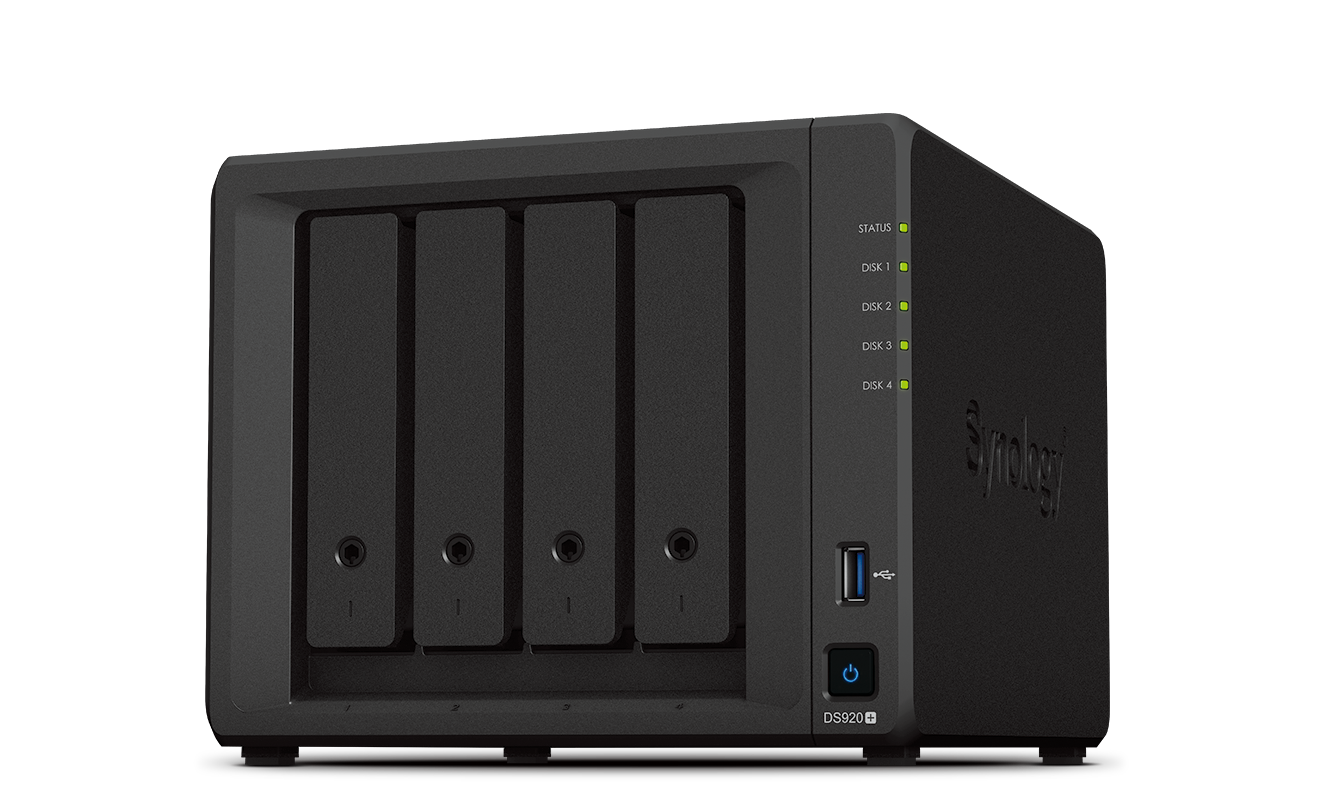
The DiskStation DS220+ is the perfect package for anyone looking to get their first NAS. It balances its performance and value proposition pretty well — a crucial factor for something catering to home users. Its two bays let you add up to 32TB of total storage, which is ample for personal use even after accounting for redundancy. The best part is that the DS220+ uses an Intel Celeron processor paired with 2GB of RAM, making it more than capable for 4K streaming through Plex and similarly demanding use cases.
- CPU: Dual-core Intel Celeron J4025
- Memory: 2GB, expandable up to 6GB
- Drive Bays: 2 bays, up to 16TB each
- Expansion: No
- Ports: 2x 1Gbe LAN, 2x USB 3.2 Gen 1
- Caching: No
- OS: DSM 7.0
- Price: $300
- Excellent value.
- 4K transcoding and playback.
- Powerful enough for home users.
- DSM 7.0 is fast and smooth.
- Doesn’t support expansion units.
- No M.2 NVMe slots.
- Only 2 years of standard warranty.
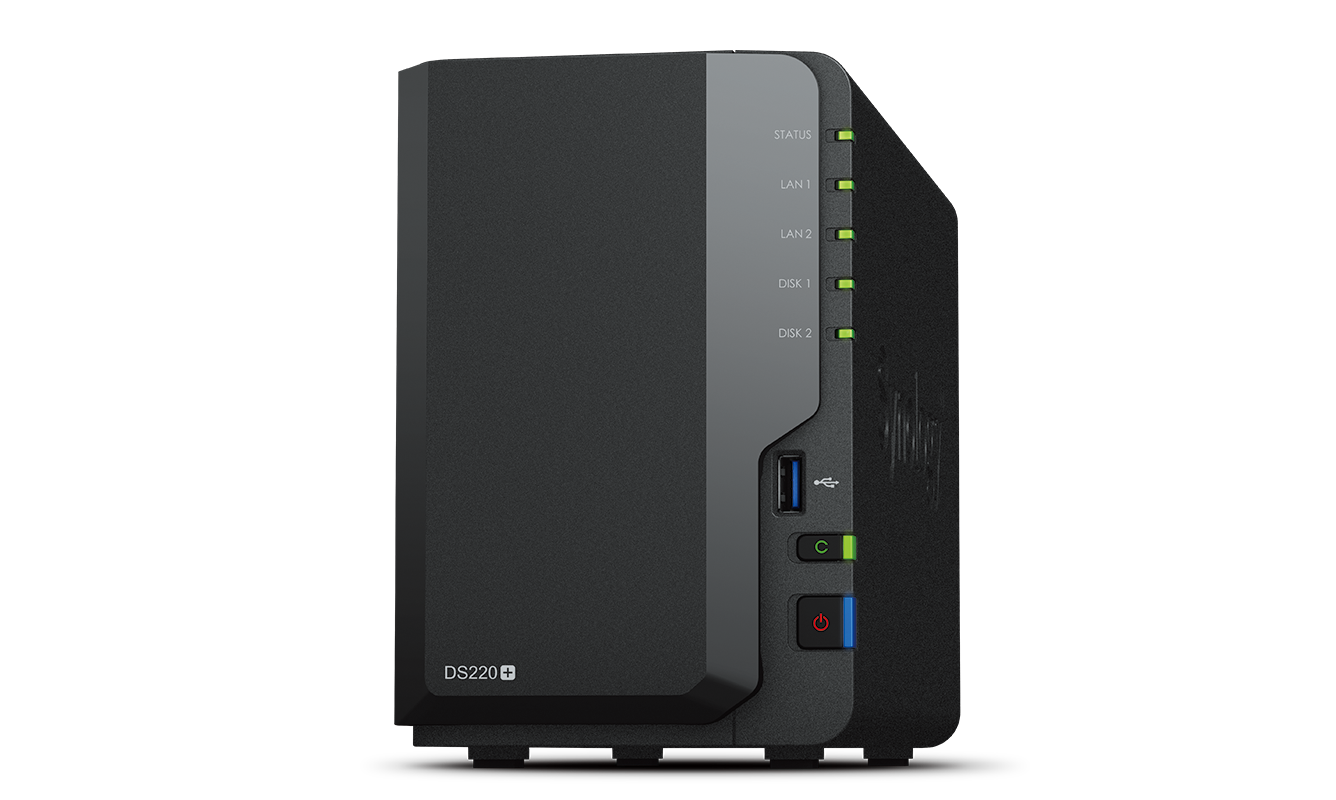
3. Synology DiskStation DS420+
If two drive bays seem limiting and you’d like to have more of them at your disposal, the DS420+ should fit your bill. With four HDD bays, you can have a storage pool of up to 64TB — double of what you get on the DS220+. It should be suitable for giving you extra headroom for years to come and the flexibility to add more drives in the future if you want to start with just a pair. The DS420+ also allows you to make use of RAID 5, 6, and 10 for improved data integration and even speed up data transfers with the option to add two NVMe sticks for caching.
- CPU: Dual-core Intel Celeron J4025
- Memory: 2GB, expandable up to 6GB
- Drive Bays: 4 bays supporting up to 16TB each
- Expansion: No
- Ports: 2x 1Gbe LAN, 2x USB 3.2 Gen 1
- Caching: 2x NVMe slots
- OS: DSM 7.0
- Price: $500
- Ample storage space of up to 64TB.
- Two NVMe slots.
- 3 years of standard warranty.
- Good for 4K streaming.
- No 2.5Gbe LAN ports.
- Expansion units not supported.
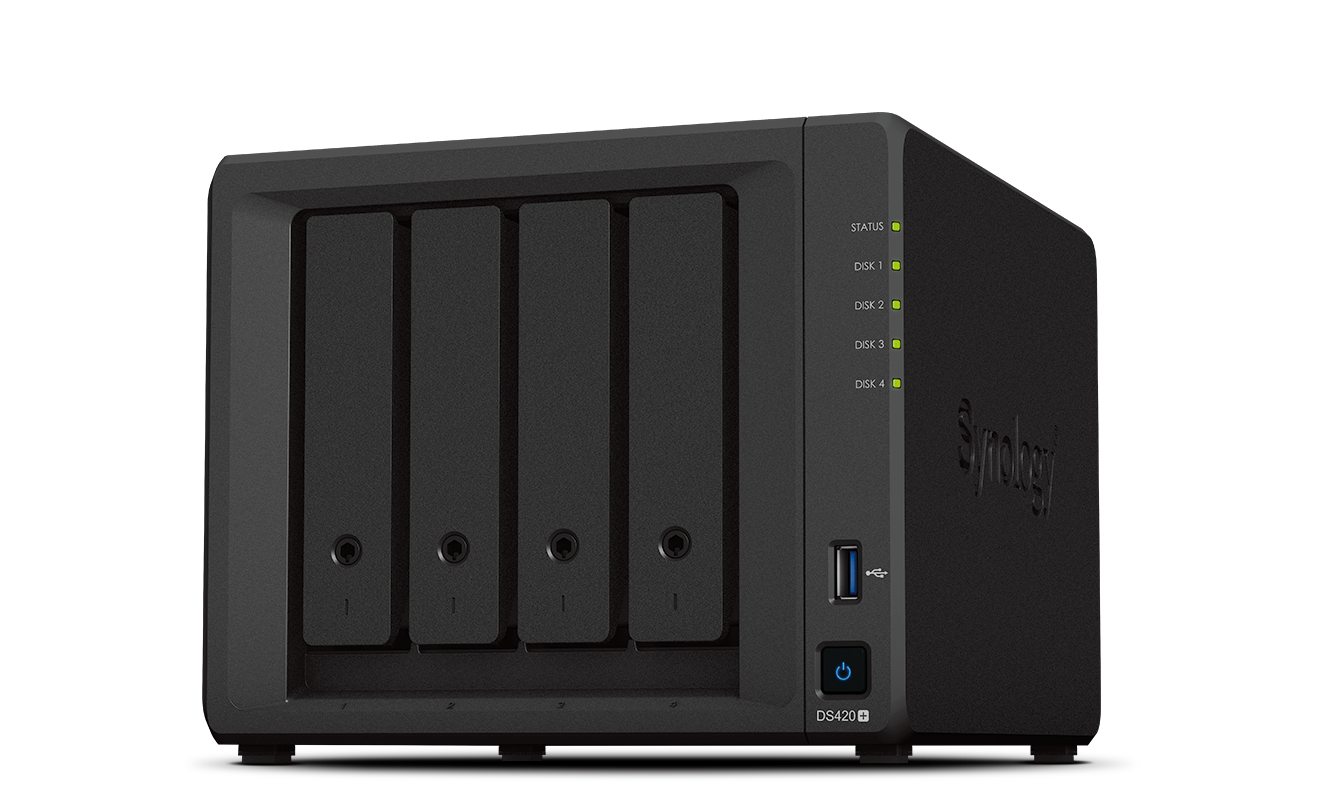
For those looking to upgrade their existing Synology NAS or want a new system for their small businesses, the beastly DS1621+ is a solid option. One of the biggest improvements it brings to the table is with its Ryzen processor. The AMD chip is not only is a nice change of pace from Intel’s domination but is also capable of doing the heavy lifting, like running server-class applications and virtual machines. In addition to the standard set of ports, you get a PCIe slot, which opens up the possibility of hooking a bunch of accessories, including the option to add a 10Gbe LAN port. While the RAM used here is of ECC variety (that helps with data integrity), it still starts at a meager 4GB, with a 16GB model also available. Synology also offers an upgraded model named DS1621xs+ that packs an even better Intel Xeon processor, a built-in 10Gbe port and starts at 8GB of RAM.
- CPU: Quad-core AMD Ryzen V1500B
- Memory: 4GB/16GB, expandable up to 32GB
- Drive Bays: 6 bays supporting up to 16TB each
- Expansion: Yes
- Ports: 4x 1Gbe LAN, 2x USB 3.2 Gen 1, 2x eSATA, 1x PCIe
- Caching: 2x NVMe slots
- OS: DSM 7.0
- Price: $900
- Scalable with two expansion units.
- Super-fast and reliable AMD Ryzen processor.
- Easy upgrades with PCIe accessories.
- Software includes a bunch of business-centric apps.
- Only 4GB of standard RAM.
- Note even a 2.5Gbe LAN port.
- Entry price can get high.
- Not suitable for 4K video streaming
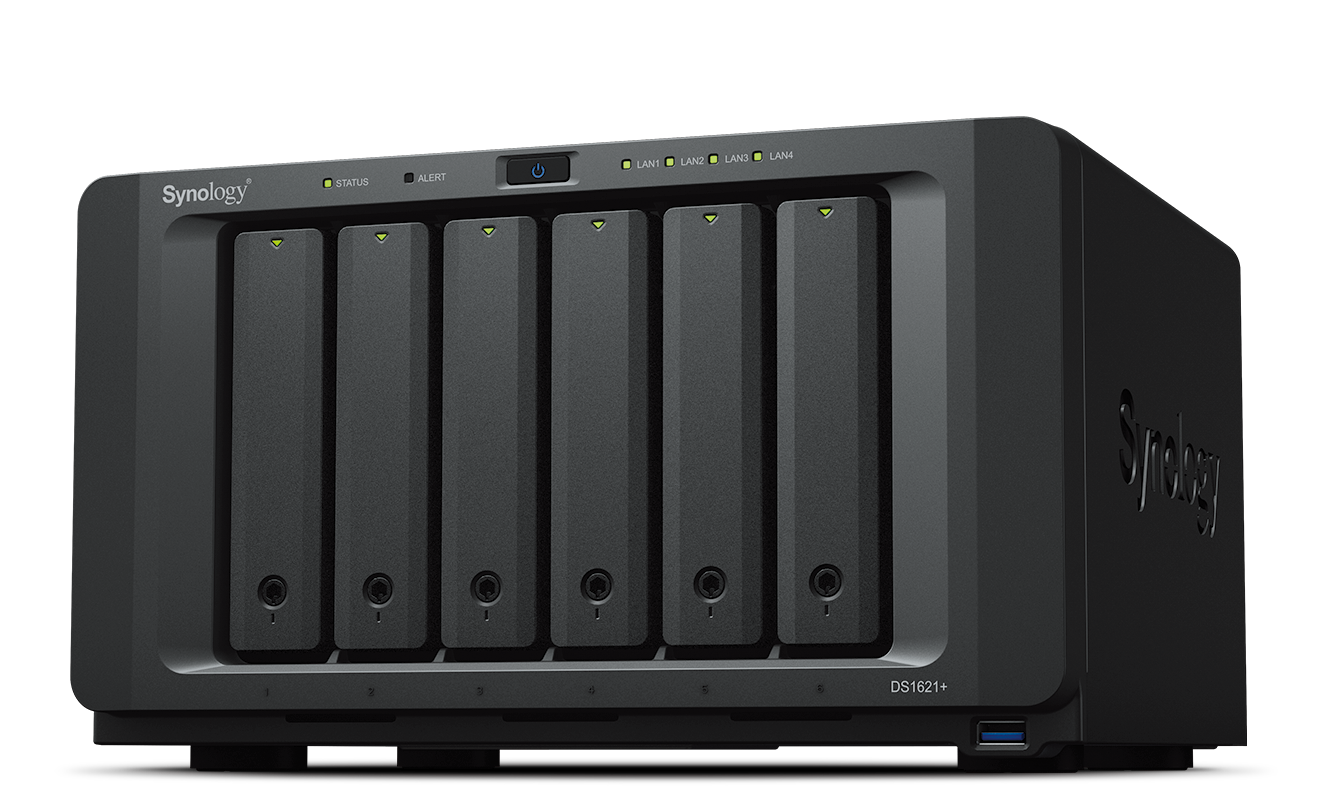
5. Synology DiskStation DS720+
The DiskStation DS720+ sort of sits in the middle, offering similar internals as the DS920+ but with only two drive bays. It is a thoughtful middle ground if you don’t want something bulky sitting on your desk or need a lot of storage space. You still get the eSATA port for attaching an expansion unit in case you ever want to add more HDDs to your NAS. One downside of the smaller DS720+ is that you have to make do with just 2GB of RAM out of the box or upgrade it post-purchase.
- CPU: Quad-core Intel Celeron J4125
- Memory: 2GB, expandable up to 6GB
- Drive Bays: 2 bays supporting up to 16TB each
- Expansion: Yes
- Ports: 2x 1Gbe LAN, 2x USB 3.2 Gen 1, 1x eSATA
- Caching: 2x NVMe slots
- OS: DSM 7.0
- Price: $400
- Supports expansion unit
- Snappy performance.
- Excellent OS and app ecosystem.
- Perfect for streaming 4K content.
- Only 2GB of standard RAM.
- No multi-gig LAN ports.
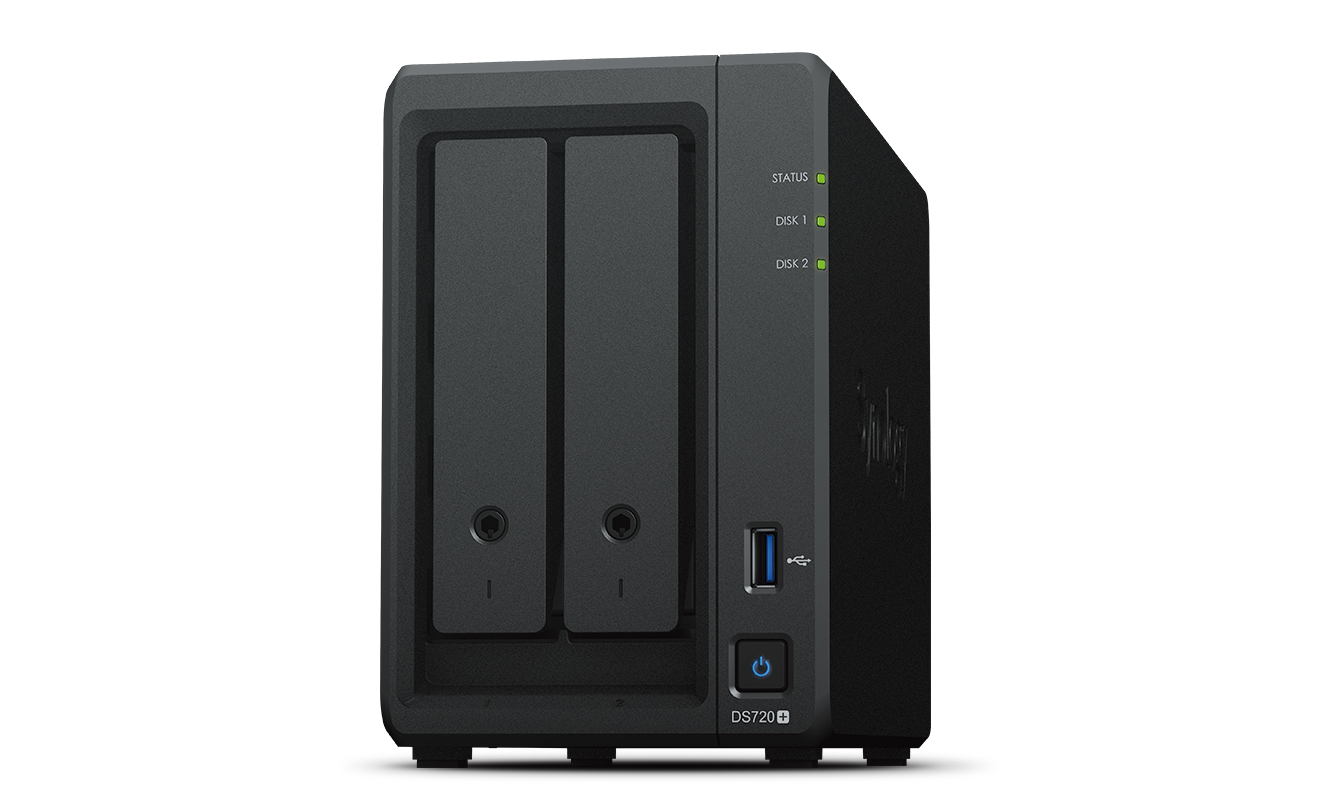
6. Synology DiskStation DS220j
The DS220j cannot match the DS220+ in terms of raw performance and isn’t particularly ideal for things like running multiple streams of videos. But its biggest selling point is its price. For less than $200, you get a Synology NAS that runs the same DSM 7.0 version and quality first-party apps as its much beefier siblings. Its basic hardware makes it a good deal if you’re looking to use it only as a storage unit for all your data or as an off-site backup option.
- CPU: Quad-core Realtek RTD1296
- Memory: 512MB
- Drive Bays: 2 bays supporting up to 16TB each
- Expansion: No
- Ports: 1x 1Gbe LAN, 2x USB 3.2 Gen 1
- Caching: No
- OS: DSM 7.0
- Price: $190
- Light on your pocket.
- Works with the latest DSM 7.0 OS.
- Good for storing and managing your files.
- Offers a good selection of ports.
- Not ideal for high-res media transcoding.
- Doesn’t support Btrfs file system.
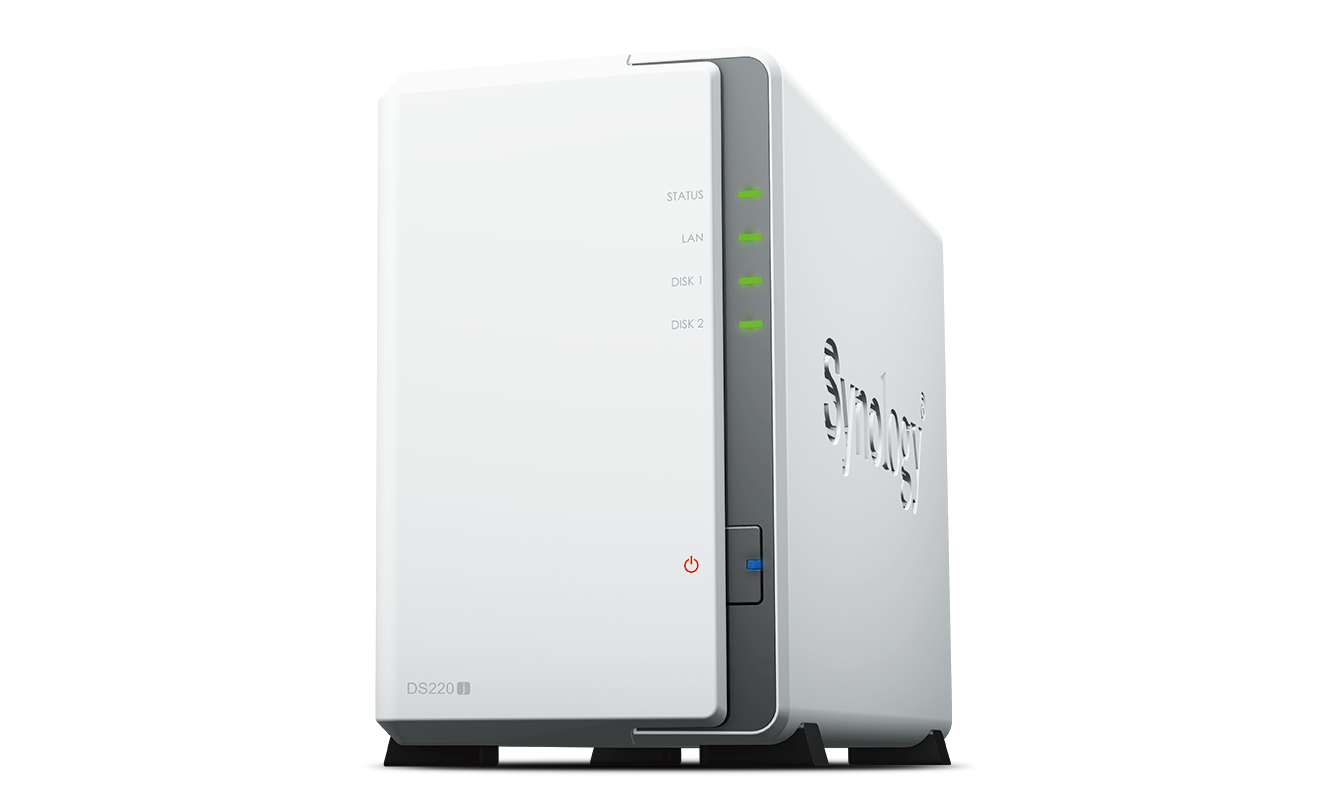
Considering your needs for today and the future
Buying a network storage box is a long-term commitment. So, it becomes necessary that the Synology NAS you’re eyeing not only meets your current needs but is also ready for the future. Being future-ready could mean different things for different users—from having the ability to add more storage to enough performance headroom to meet the needs of a growing team and application load.
Most home users looking to set up a personal media server can easily get away with the DS220+. It’s a capable machine that can handle up to a single 4K transcoded stream, which is more than enough for movie watching at home. Even after providing for redundancy, you’ll still have several TBs of storage to house your entire movie collection and backup your family photos.
But a Synology NAS’s capability isn’t limited to merely being a Plex server. There are a lot of things that these enclosures support, ranging from a surveillance station to even having your own private mail server. For applications like these, the extra horsepower of the DS920+ is the perfect middle ground for buyers who are ready to spend a little more.
For more advanced, CPU-heavy productivity tasks, your best bet is the DS1621+ (or the DS1621xs+). The quad-core AMD Ryzen chipset is more powerful and a refreshing upgrade over the Intel processors usually included at this price point. This particular Synology model, however, is best suited for a professional setting because of its limited 4K transcoding capability without an integrated GPU.
Synology offers even more capable — and pricier — NAS devices, but they generally fall in the super-expensive category and are feasible only for a niche consumer group. The recommendations here won’t break the bank but can still cater to a wide range of user needs.
It’s worth noting that the software remains the same no matter which Synology NAS you go for — it’s the hardware that you really need to pay attention to when making a decision. Be sure to account for NAS-specific hard drives, too; those can run into several hundreds of dollars all on their own, depending on the storage pool you want.


